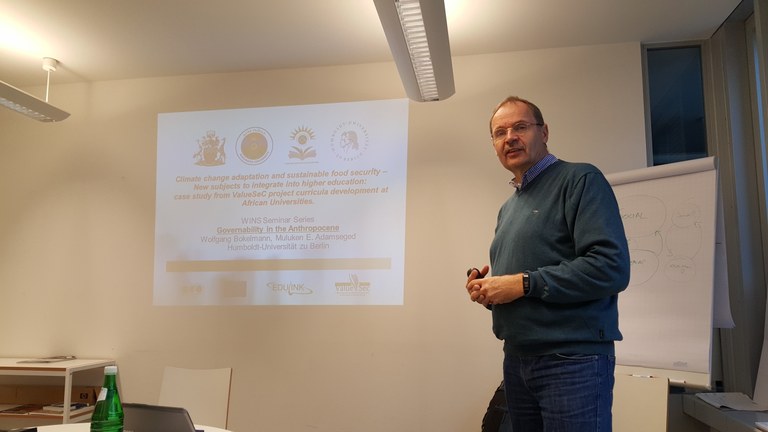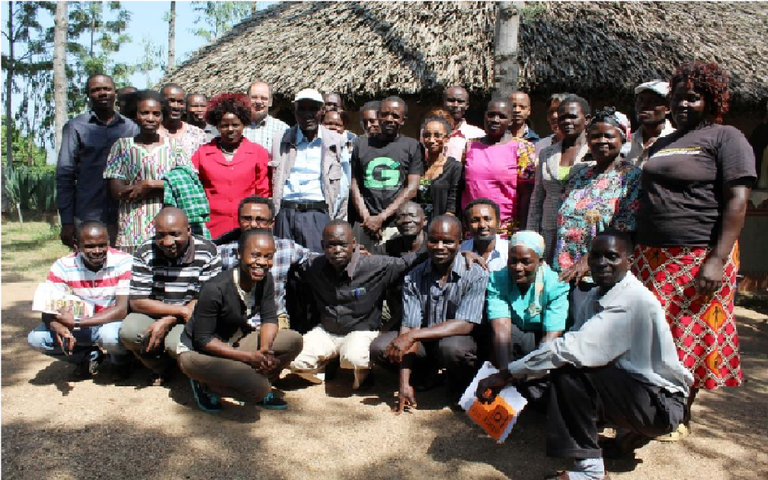Documentation
Reports, research results and workshop material can be shared here. Also, conference presentations and photos can be shared to ensure the project visibility.
General Information
- Click to open the ValueSeC fact sheet.
- Have a look at the ValueSeC Poster
Impressions from the WINS Seminar
In Sub-Saharan African, agriculture dominates the economy. Smallholders strongly depend on the agriculture for incomes, food security and employment. Agricultural produces reach consumers via multilevel marketing systems, not directly from production. Thus, the fights to achieve food and nutrition security as well as prosperity for these countries will be won or lost by the way agriculture and its value chains are coordinated. The ValueSeC project is designed to reinforce and intensify exchange and collaboration between universities, rural stakeholders and research organizations in Ethiopia, Kenya and Germany with a focus on a) institutional capacity-building and b) further development of the food value chain concept. This integration will boost the introduction and enhancement of inter-disciplinary teaching, problem-based and participatory research and will provide necessary expertise to safeguard sustainability. This would further enable to adapt to challenges of agriculture, increase its production and enhancing the coordination of actors along the entire value chain.
Prof. Bokelmann presenting at the WINS Seminar

Fig.: Muluken Adamseged
Prof. Bokelmann presenting at the WINS Seminar

Fig.: Muluken Adamseged
Impressions from the Tropentag Conference in Vienna
ValueSeC Contributions to the Tropentag 2017
We are proud to publish the ValueSeC´s contributions of the Tropentag 2017 in Vienna
Paper:
"Climate Change Awareness and Smallholder-Oriented Constraints and Opportunities in the Upper Rift Valley in Ethiopia"
by C. Wittekind, F. Ewich and Prof. Dr. K. Peters
from Humboldt-Universität zu Berlin, ADT-Institute of Agricultural and Horticultural Sciences, Germany
see Abstract
see Poster
read Paper
Paper:
"Income Risk and Coping Strategies of Small-Scale Vegetable Farmers in the Central Rift Valley, Ethiopia"
by G. Behrendt, N. Boehm and Prof. Dr. K Peters
from Humboldt-Universität zu Berlin, Albrecht Daniel Thaer-Institute of Agricultural and Horticultural Sciences (ADTI), Germany
see Abstract
see Poster
Paper:
"Economic Returns and Smallholder Participation in High-Value Markets for African Indigenous Vegetables in Rural Kenya"
by D. Jalango, D.Otieno and Prof. W. Olouch-Kosura
from University of Nairobi, Agricultural Economics, Kenya
see Abstract
see Poster
read Paper
Impressions from the ValueSeC Disemmination Workshop in Nairobi in 2016
from 13th to 14th June 2016 at the University of Nairobi - College of Agriculture and Veterinary Sciences, 15th June 2016 at KALRO, Kisumu, and field visits in Bondo and Budalang’i, Western Kenya on 16th and 17th June 2016. The meeting was facilitated and documented by the University of Nairobi ValueSec project team: Prof. Willis Oluoch-Kosura, Dr. David Jakinda Otieno, Dennis Etemesi Olumeh, Dorcas Anyango Jalang’o and Lawrence Ongwae Moranga.
Report of the Value Chain Development for Food Security in the Context of Climate Change (ValueSec) Project Stakeholder Dissemination Workshops in Kenya
A North-South EDULINK II collaborative project among four partner universities; Humboldt University of Berlin, University of Nairobi and Karatina University in Kenya, and Haramaya University in Ethiopia under a project titled “Value Chain Development for Food Security in the Context of Climate Change (ValueSec)” held its stakeholder dissemination workshops from 13th – 17th June 2016 in Kenya. The workshops comprised: two days of interactions and sharing of lessons between staff and students from the partner universities, and four days of farm visits to share research findings with local-level stakeholders and co-create feasible policy suggestions.
The main lessons learnt from the ValueSec dissemination workshops were:
- Multidisciplinary research: from the plenary sessions it was observed that it is vital for future research to incorporate researchers and/or students from different backgrounds to enhance cross-learning.
- Farmer groups are important: the idea of collective action is key if farmers are to realize benefits and access high-value markets but there is need to have proper management and clear objectives.
- Greater involvement of farmers in the research process: interactions during the farm- level dissemination workshops revealed that farmers are enthusiastic in being incorporated in co-creating of research designs and interpretation of research findings.
- Need to improve sharing of information between farmers and extension officers: it was observed that there was a lot of information gap between the extension officers and farmers. It was suggested that extension officers should device better ways of disseminating this information including use of easily accessible forms of information and communication technology (ICT).
- Partnerships for capacity building: farmers expressed great desire to partner with researchers and other development agencies in improving the sharing of skills on value chains activities. Specifically, farmers would like to obtain further training on value addition, marketing and modern technologies for green house farming.
- Need for positive attitude change: participants agreed on the importance of being proactive and self-reliant in managing climate change effects. It was observed that continued reliance on external support and emergency assistance is not a sustainable approach to address climate change menace. Therefore, the need to explore and adapt locally-suitable interventions was underscored.
Go to the full report.
Impressions from the Ethiopian-German study project in 2015
from 26th of August to 10th of September 2015
Value Chain Development for Food Security and Income Generation in the Context of Climate Change
The Case of Fresh Vegetables in Ethiopia
Abstract
This study examines smallholder-oriented constraints and opportunities within the vegetable value chain in the Upper Rift Valley in Ethiopia by analyzing its stakeholders, the enabling environment and supporting markets. The four-dimensional perspective focuses on the value chain development for food security and income generation in the context of climate change with a special focus on gender issues. Continuous governmental food aid, insecure livelihoods and decreasing groundwater levels, for instance, show growing importance of these four dimensions in the agricultural sector of the project area. Both an inductive and a deductive research approach are applied to ensure sufficient data for the research project. For the inductive part, a value chain analysis, using semi-structured interviews and non-participatory observations are conducted. The deductive part tries to test the hypotheses about the interlinkages between value chains and the four dimensions by secondary literature analysis and semi-structured expert-interviews. The results of the study show high interlinkages between the four dimensions and reveals the main challenges in the vegetable value chain. Women highly contribute to the agricultural labor force in the project area, but due to strong traditional gender role models they are not very well represented therein. Female-headed households face high sensibility to climate and market variations. Besides, severe water scarcity due to climate change and inefficient water management as well as lacking irrigation schemes are crucial problems for smallholders. They face unstable yields and income instability because of uncertainties caused by climate variability and price volatility. Regarding technical expertise, there is a huge knowledge gap and lacking access to technology, causing high transaction costs and inefficiencies. Deficient market integration, poor transparency and information asymmetries lead to high dependency on middlemen and a low income. In summary imperfect market conditions of vegetables with a high degree of informalities and the role and power of middlemen, are seen as main challenge of vegetable value chains in the project area. The study recommends to conduct a comprehensive market analysis in order to tackle the four-dimensional challenges identified.
Go to the final report.
Impressions from the ValueSeC Annual Workshop in Germany 2015
from 21st to 24th of September 2015
Impressions from the German-Kenyan study project in 2015
from 14th to 26th of March 2015
Horticulture in the Mt. Kenya Region – Dynamics and Challenges in the Context of Globalization.
Experiences of an Intercultural Study Project
- to strengthen the capacity of higher education in Kenya (and Ethiopia) to cope with issues of food security, poverty reduction and climate change adaption/ mitigation in the area of food value chains;
- to sustainably foster the development of inter-institutional linkages networking and academic partnerships among higher education institutions (HEIs) within Eastern Africa as well as with European HEIs.
Go to the final report.
Beautiful Mt Kenya region
Photo credit: Frederic Becker

Fig.: Frederic Becker
Joint fieldwork of students
Photo credit: Frederic Becker

Fig.: Frederic Becker
The Kenyan-German team

Fig.: Frederic Becker
Knowledge exchange at a meeting
Photo credit: Frederic Becker

Fig.: Frederic Becker
Horticultural produce at a local farmers market
Photo credit: Frederic Becker

Fig.: Frederic Becker
Impressions from the First ValueSeC Annual Workshop and Stakeholder Meeting at Haramaya University, Ethiopia 2014
from 29th of September to 4th of October 2014, Haramaya University, Ethiopia
Minutes from the Workshop
click to see the Minutes from the Annual WS at HARU, Ethiopia
Welcome speech by Dr. Girma Amente, president of Haramaya University

Fig.: Muluken Adamseged
Activity reports by partner institutions

Fig.: Muluken Adamseged
Activity reports by partner institutions

Fig.: Muluken Adamseged
Activity reports by partner institutions

Fig.: Muluken Adamseged
At the local stakeholder workshop bringing together farmers, NGOs, government officials, co-operative officers

Fig.: Muluken Adamseged
At the local stakeholder workshop bringing together farmers, NGOs, government officials, co-operative officers

Fig.: Muluken Adamseged
At the local stakeholder workshop bringing together farmers, NGOs, government officials, co-operative officers

Fig.: Muluken Adamseged
At the local stakeholder workshop bringing together farmers, NGOs, government officials, co-operative officers

Fig.: Muluken Adamseged
At the local stakeholder workshop bringing together farmers, NGOs, government officials, co-operative officers

Fig.: Muluken Adamseged
Annual workshop: Field excursion to a local commercial fruit farm: Fatyia Mohamed Agricultural Products Ltd.

Fig.: Muluken Adamseged
Ms. Fatiya Mohamed presents her farm

Fig.: Muluken Adamseged
Wage labour at Fatiya Mohamed Agricultural Products Ltd.

Fig.: Muluken Adamseged
Papaya production at Ms. Fatiya Mohamed's farm

Fig.: Muluken Adamseged
Banana production at Ms. Fatiya Mohamed's farm

Fig.: Muluken Adamseged
Annual workshop - Excursion participants

Fig.: Muluken Adamseged
Commercial maize production at workshop excursion

Fig.: Muluken Adamseged
Commercial potato production at workshop excursion

Fig.: Muluken Adamseged
Commercial cabbage production at workshop excursion

Fig.: Muluken Adamseged






























